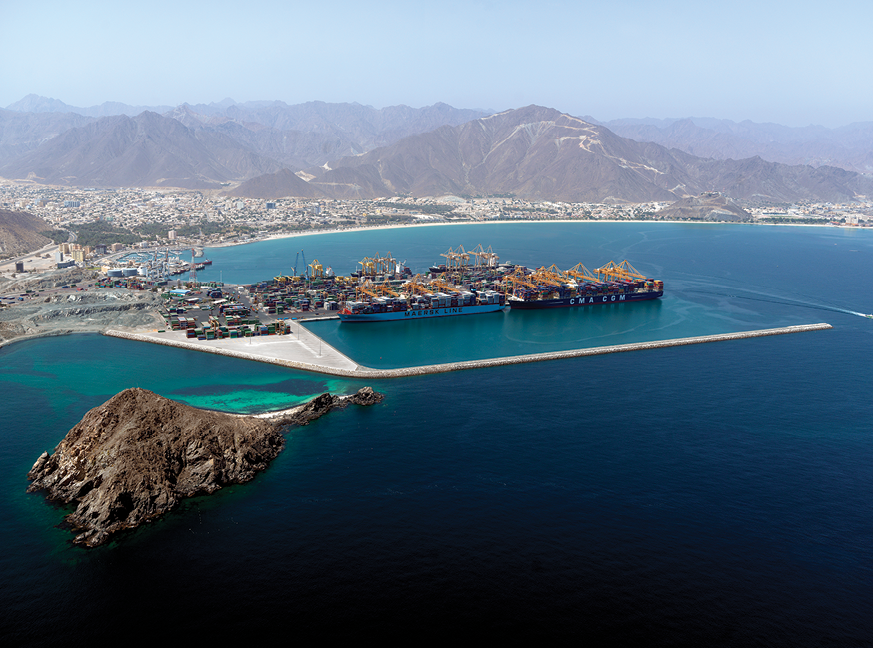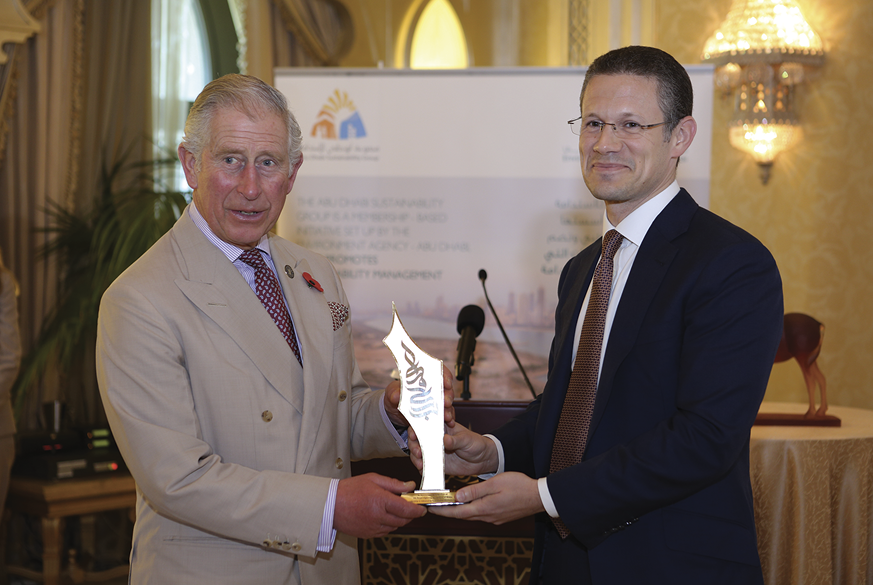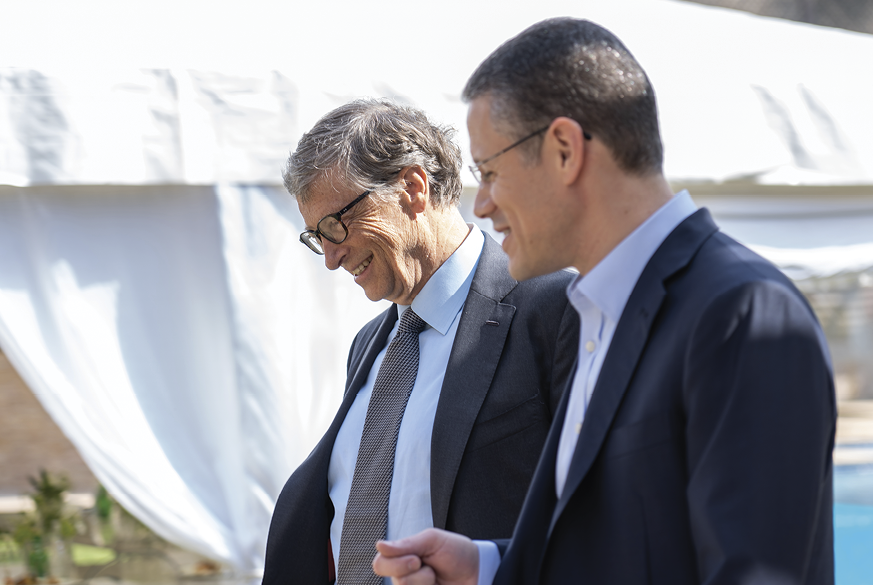- Home
- Media Kit
- MediaJet
- Current Issue
- Past Issues
- Ad Specs-Submission
- Ad Print Settings
- Reprints (PDF)
- Photo Specifications (PDF)
- Contact Us
![]()
ONLINE
![]()
ONLINE

Profit and Purpose
Editors’ Note
Badr Jafar is also President of Crescent Petroleum. He is the Managing Director of Crescent Group, which has been operating from the UAE as a family business group for 50 years, and is the parent company of Crescent Enterprises and Crescent Petroleum. Jafar serves as Chairman of Gas Cities, a joint venture between Crescent Petroleum and Dana Gas PJSC, and as Chairman of Pearl Petroleum, a partnership between Crescent Petroleum, Dana Gas, OMV of Austria, MOL of Hungary, and RWEST of Germany. In 2010, Jafar founded the Pearl Initiative, a nonprofit organization in cooperation with the United Nations Office for Partnerships, to promote a corporate culture of transparency and accountability across the Gulf Region of the Middle East. He has been appointed as a member of the United Nations Secretary General’s High-Level Panel on Humanitarian Financing to address and examine the growing humanitarian financing crisis. Jafar has a longstanding engagement with the World Economic Forum, and was recognized as a Young Global Leader in 2011. He is Co-Chair of the WEF Family Business Community, a member of the WEF Stewardship Board on New Economy and Society, and Stewardship Board on Digital Economy and New Value Creation. Jafar serves as a Champion of the WEF EDISON Alliance to advocate for inclusive access to digital services in the MENA region and beyond.
Company Brief
Crescent Enterprises (crescententerprises.com) is a multinational company headquartered in the United Arab Emirates. It operates under four platforms: CE-Operates, CE-Invests, CE-Ventures, and CE-Creates, which span diverse sectors including ports and logistics, power and engineering, food and beverage, business aviation, and across verticals such as private equity, venture capital, and business incubation.

Gulftainer, Khorfakkan Container Terminal
Will you provide an overview of Crescent Enterprises’ business and highlight its results across the four platforms?
Crescent Enterprises delivered strong results over the past year, and we further solidified our commitment to sustainable business models and responsible operations as we grew to 52 subsidiaries, affiliates, and investments with operations in 15 countries. We continued to invest in various growth areas across new sectors and borders.
Crescent Enterprises’ CE-Operates platform, which oversees our operating businesses, mainly in the infrastructure sector, and acts as a main driver of economic development and growth, has continued developing critical infrastructure and enhancing efficiencies across its global operations. The platform’s focus on sustainable development has been steadfast, with various initiatives implemented to reduce its carbon footprint.

H.H. Sheikh Dr. Sultan bin Muhammad Al Qasimi
(UAE Supreme Council Member and Ruler of Sharjah) and
Badr Jafar with the artists of the Middle East Theatre Academy’s
inaugural project, “Home Grown,” in 2015
CE-Invests platform, our balanced portfolio of alternative asset class investments, including private equity, real estate, and other structured investments, delivered steady operational and financial performance. The platform, and its portfolio funds, successfully exited several investments and continued its expansion strategy.
CE-Ventures platform, our corporate venture capital portfolio, delivered top quartile performance, with a 2.90 multiple on invested capital and a net 43.6 percent internal rate of return (IRR). The platform expanded its investments in breakthrough biotechnology and deep tech, with applications and impact across a wide range of industries. CE-Ventures has itself invested $220 million to date in ventures, both in the UAE and internationally. This places us firmly on track to achieve our commitment to invest over $250 million in start-ups by 2023.
CE-Creates, Crescent Enterprises’ youngest platform, launched 5 years ago as our internal new business incubator to create, nurture, and scale brand new concepts that are built on strong foundations of social purpose, joined forces with Abu Dhabi-based venture builder hatch & boost in the first merger of its kind in the Middle East and North Africa (MENA) aimed at advancing impact driven start-ups across our region. Together, we now have 12 new business concepts in the incubation pipeline, many of which we expect will successfully launch as sustainable businesses within the next 12 months.

Badr Jafar visits Kutupolang Camp in Bangladesh
with the Big Heart Foundation in 2017
Will you discuss Crescent Enterprises’ commitment to sustainability and how sustainability is embedded across its operations?
From my point of view, sustainability is not a goal in itself, it’s a way of thinking and having a compass point for businesses and individuals towards balancing three factors: social, environmental, and economic. You need all three to make it work, and when you strip away the jargon and platitudes, what you are left with is your purpose. I feel that there is a misconception where we, as a business community, are engaged in some sort of zero-sum game with our businesses, where there must be a trade-off between profit and purpose. The notion that you must give one factor up or compromise on it, in order to generate some of the other, is something I strongly disagree with. On the contrary, I believe that a business without a clear purpose is likely to be an unsustainable business. The best businesses align profit and purpose, and the most sustainable ventures in the long term will always be the ones that have an authentic cause built into them, rather than as an unintended consequence or as an afterthought.
This principle really runs through all our activities at Crescent Enterprises, and we’ve woven sustainability into our operating fabric, where we gauge our business performance not just on financial results, but also on our contributions to environmental, social, and governance objectives.
We also strive to report on it as transparently as possible. In fact, this year will be our 11th anniversary of publishing our annual and sustainability report. We used to publish them as two separate reports, and as a private business we don’t have to publish either, but I felt from a transparency perspective, which is a phenomenal tool for building trust with your broader stakeholder group, it made perfect sense. Hence, our combined report is not just our financial performance, but also our social, environmental, and governance metrics. We benchmark our operations against the 17 sustainable development goals to see where we, as an organization, are generating the most impact against these goals and where we could do better – all towards the world’s agenda and mission to achieve those goals by 2030.

Badr Jafar presents the current King Charles III with
the ‘Pearl Initiative Champion of Sustainability Award’ in 2016
When evaluating a start-up, how do you measure or quantify its potential social impact, and do financial returns compromise that impact?
Primarily, understanding the purpose of a particular start-up or venture or the problem it is setting out to address and solve is integral, even before you evaluate if it can do this sustainably. It is understanding if the venture leader or the entrepreneur behind that idea really understood the problem that they’re setting out to address, and if that solution is clearly articulated. This depends on what stage the start-up is – if it’s just an idea phase, then there’s no evidence yet, hence you must help the entrepreneur come to terms with the issue that they’re trying to solve. If they have some track record and have already generated some impact, then you can dig into those metrics to understand whether that fundamental purpose is being addressed.
Is it possible for you to have a wonderfully combined holistic approach to societal impact, without there being a compromise or a trade-off? The answer is that it depends on the timeline you’re talking about. In the steady state, I fundamentally believe that there is no trade-off, and there shouldn’t have to be. In the steady state, you will have enhanced economic value and financial returns if you are delivering on that social promise. In the short term though, you may have some compromise, which is why for venture entrepreneurs who are looking for venture capital for growth, they need to make sure that they find investors and venture capital that is aligned with their long-term goals. Many funds today have to generate certain returns over a certain period of time, otherwise it’s going to skew their numbers. If an entrepreneur chooses to accept venture capital from those type of firms, he/she is going to potentially be scrutinized on a quarterly basis on financial returns, which might add some pressure and force them to cut corners on their social mission.
We pride ourselves at CE-Ventures – our corporate venture platform – to be invested in someone for the long term if we feel that what they’re doing delivers on the original promise, and if they are also financially sustainable. We do not have the same complexity as institutional venture capital does, but aligning the nature of money with the venture itself is extremely important to have a healthy relationship.

Kava & Chai, a company owned by Crescent Enterprises,
at Mall of the Emirates in Dubai
What is one thing that has had a lasting impact on you and that has guided you as you progressed into the leader you are today?
For me, education is a lifelong journey, and with the pace of change in our world getting faster, the sooner we embrace the concept of lifelong learning in our societies, the better it is. While university degrees are still important, because they are valued by our existing economic systems, everyone should really think of education as a skill that needs to keep being honed, otherwise it will wither.
If I had to pick one thing that had a lasting impact on me, it would be my exposure to community service. This was during my time at school, wherein as part of your formal education, you were encouraged to do a few hours of community service a week – from teaching third graders math, to spending time with terminal patients at local hospitals, to helping get groceries for the elderly. These phenomenally impactful experiences helped align priorities for me and helped me overall to define a compass point for the purpose in what I do.
This is also why I have for many years advocated for better community service programs in the MENA region with better formal opportunities for volunteering. We have a major challenge with youth unemployment in the MENA region pushing it to 40 percent in some countries, which is by far the highest in the world and sadly is getting worse, so we urgently need to create opportunities for youth. This doesn’t need to mean just jobs. In fact, I think a single-minded focus on job creation prevents us from seeing the true challenge and opportunity that lies ahead of us, and that is instilling a strong sense of purpose and a feeling of belonging within our youth.
The global risks perception survey by the World Economic Forum, published in 2022, highlights youth disillusionment and the erosion of social cohesion as critical short-term threats to the world. Therefore, in parallel with the overwhelming challenge to create tens of millions of meaningful and productive jobs, we urgently need to deploy all the tools at our disposal to strengthen the fabric of our local communities, including through initiatives such as community service. My first exposure to that was through my formal education, so I think as with all very strong societies and economies, an education system that helps to bring out the best of humanity in a person will serve us extremely well, particularly as we go into a world with increasing uncertainty and challenges.

Badr Jafar with Bill Gates during his visit to
the UAE in November 2019
You founded the Pearl Initiative in 2010. What has the organization’s journey been since inception, and how is it working to improve corporate governance?
The Pearl Initiative was established 12 years ago, by business and for business, as a nonprofit organization to promote the business case for embracing corporate governance and sustainable business practices. The Pearl Initiative is steadfast in its belief that high standards of corporate governance and integrity are key drivers of competitiveness, investment, job creation, and sustainable economic growth. The organization pursues its mission by convening business leaders and student communities in programs that span governance in family firms, governance in tech companies, governance in MSME’s, diversity in business leadership, anti-corruption best practices, and governance in philanthropy.
Over the past decade, the Pearl Initiative has developed and published 155 research reports and data-driven publications, and convened 12,500+ business executives in 222 roundtables, workshops, and webinars held across the Gulf region. A recent Pearl Initiative poll found that 62.9 percent of college students in the Gulf are unaware of the importance of corporate governance, which is why the organization engages with 43 universities across the Gulf and reaching over 11,000 university students through case studies to encourage students to be drivers of change in strengthening the GCC’s sustainable growth trajectory.

Badr Jafar with Quincy Joses and children during the
filming of Tomorrow/Bokra (charity anthem) in Rabat, Morocco
You have been spearheading a number of philanthropic initiatives in the region and globally. What role can philanthropy play alongside business and government in solving regional challenges?
For far too long, philanthropy has been treated like the neglected child of our capital system. Here in the MENA Region, and in the broader Islamic World, we have a long history of charitable giving and today, anywhere between 400 billion to one trillion dollars is dispersed in Islamic philanthropy every year, between Zakat and Sadaqah. However, with two-thirds of the population in the Middle East classified as vulnerable to poverty, we are not optimizing the use of this capital.
The UAE is one of the most generous nations in the world, and we have a massive opportunity to create the structures and platforms needed to nurture a new generation of philanthropists and philanthropic ventures that can partner with government and business capital to address our most urgent challenges using the principles of strategic philanthropy that is transparent in its application and results-driven. This is why I was fortunate enough to collaborate with the likes of the University of Cambridge on the establishment of a new Centre for Strategic Philanthropy, exclusively on strategic philanthropy both within and from the world’s emerging markets, and more recently with NYU-Abu Dhabi on a similar initiative dedicated to the Gulf Region.
As a Founding Patron of the Centre for Strategic Philanthropy and the NYU Abu Dhabi Strategic Philanthropy Initiative, what are you personally hoping they can achieve?
There is a seismic shift that is currently underway across the global economy where the top 30 fastest growing economies in the world today are all in emerging markets. It’s estimated that over $5 trillion in wealth is going to be passed from one generation to the next within these economies over the next 10 years. This suggests that we can expect to see a significant rise in philanthropic activity in these societies in the coming decades. The overall hope for initiatives of this nature is to help to enhance the impact that philanthropic capital is going to have as it is dispersed within the markets themselves, and from those markets to the rest of the world.
Many philanthropists across the MENA region and many emerging markets such as Latin America, Sub-Saharan Africa, or developing Asia, are becoming increasingly active globally and are dispersing significant funds towards global causes. So, wherever there’s an opportunity to help enhance the impact of that capital, that is what these initiatives are going to be guided by.
The other dimension is one of partnerships and collaborations, and this applies across any sector – business, nonprofit or education. As the saying goes ‘if you want to go far, go together.” There is an opportunity within the philanthropic sector for people to work together and learn from each other through each other’s mistakes and successes.
Through the Centre for Strategic Philanthropy at the University of Cambridge and the Strategic Philanthropy Initiative at the NYU-Abu Dhabi, we are hoping that nonprofit and independent projects of this nature can help bring people together and encourage partnerships and collaborations. It doesn’t always need to be about money being co-invested. There are many different types of collaborations and partnerships that can be formed around philanthropic ventures, so hopefully we can help to connect these dots, because very powerful things can be achieved when you bring people together who have the same purpose and mission and help to pool their resources together and create a multiplier effect.![]()